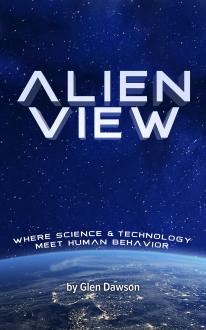Glen Dawson - A Satirical Wake-up Call

After graduating from Duke University, Glen Dawson owned and operated a flexible packaging manufacturing plant for 23 years. Then, he sold the factory and went back to school to get his Master's degree in biostatistics from Boston University. When he moved to North Carolina, he opened an after-school learning academy for advanced math students in grades 2 through 12. After growing the academy from 30 to 430 students, he sold it to Art of Problem Solving. Since retiring from Art of Problem Solving, he has started an entertainment company called Alien View, LLC. As our Author of the Day, he tells us all about his book, Alien View.

Please give us a short introduction to what Alien View is about.
Alien View is a series of brief five minute episodes that examine the effects of science and technology on human behavior through a satirical lens.
Your book "Alien View" has been described as a thought-provoking exploration of humanity's most pressing issues, blending satire with insights into science, technology, and human behavior. What inspired you to take this unique approach in addressing contemporary challenges?
I have been blessed to have been exposed to a wide variety of subjects due to my background and interests. I think it has become increasingly clear to many observers that our brave new world of technological progress is causing some serious, even existential problems. Clearly, something is wrong, but it is not clear as to exactly what that "something" is. Alien View is an attempt to engage the reader into thinking about what that "something" might be.
The book challenges readers to adopt an "Alien View," shedding our human biases and preconceptions to examine the world from a different perspective. How do you envision this alternative viewpoint impacting readers' understanding of societal issues?
Well, that gets back to the "something" referred to above. The "Alien perspective" is to imagine that we may appear to aliens as our dogs appear to us. While we may be impressed by how "clever" our dogs are at times, it is hard to escape how often these beloved animals are overcome by their passions and emotions. How their behavior seems to be driven by them. No amount of intellectual conversation can convince our dog to stop running across the busy street to chase the neighbor's cat. In essence, we judge most "lower" creatures by their behavior, not their intellect. And more importantly, we clearly understand that their behavior is not driven by any sort of intelligent evaluation of their situation. The very notion of intelligence is ill-defined. What exactly is it? Does it even exist?
Besides writing, what other secret skills do you have?
Ha ha, not sure what qualifies as a "secret" skill. I suppose when I learned how to stop trying to meditate and instead practiced "non-meditation", then I really understood what meditation is. But I cannot explain it to you because it is not something that I understand how to express in words. It seems to be more of an unconscious process. It is a well-known but frequently ignored fact that a great deal of the human thought process is unconscious. We are not aware of it. And it never penetrates to a level that we can verbalize. So, we cannot talk about it. So, I suppose that is my secret skill. Knowing how to meditate by not meditating.
One of the strengths of "Alien View" lies in its episodic and humor-filled stories. Why did you take this approach?
As my wife says, "Nobody will read Alien View because you are talking about uncomfortable things that people would prefer to ignore". So, I tried to couch the discomfort in entertaining attire, with the hope that people might be enticed to give a bit of thought to their discomfort and think about what it means. You know, maybe take a break from ignoring reality and stare it in the face, even if it doesn't look that great.
Your background spans economics, statistics, education, and now writing. How have these diverse experiences influenced your perspective on the intersection of science, technology, and human behavior, as explored in "Alien View"?
Hard to say. I cannot tell you where my ideas come from. Probably part of that "unconscious process" we discussed above. I think my ability to read for eight hours per day probably helps new ideas to penetrate into my subconscious. After all, we learn by listening to others. There are so many talented writers these days that have generously shared their ideas with others.
Reviewers have praised the book for its inventive narrative style and insightful exploration of contemporary themes. Can you tell us more about your creative process and how you approached blending allegorical storytelling with social commentary?
I'm sorry, but I truly don't know. It just comes to me. I think my themes are not contemporary, though. They are eternal.
In "Alien View," you tackle existential risks posed by advancements in science and technology. How do you balance highlighting these risks with maintaining a sense of optimism or hope for the future?
Ah, well I must admit that my "balance" probably derives from my conviction that humans are just another animal on this tiny planet. We are not "gods". We will come and go. This is the nature of life. Species rarely survive for long periods of time. I don't see anything terribly wrong with this. After all, we are all going to die eventually. So, why not accept that our species may die someday, too? Aha, I think I hear my wife whispering in my ear, "Glen, this is one of those uncomfortable things that people don't want to hear. So, be quiet and sit down."
Your book has been likened to a modern-day Socratic dialogue, using humor and satire to dissect human folly and societal trends. What do you hope readers will take away from these philosophical exchanges?
That perhaps we can live in harmony if we accept our limitations with humility, and respect the diversity of life on our planet. Not just the diversity of human life, but the diversity of all life. And perhaps if we accept the notion that, as a species, we only have one life to live, well then let's try to make the best of it.
As an author who has ventured into various fields, from academia to entrepreneurship, what message do you hope to convey to readers through "Alien View" regarding the importance of interdisciplinary thinking in addressing global challenges?
Maybe a good first move would be to step out of our social media echo chambers and actually listen to people with different perspectives. One of my hobbies is investing in stocks. I have learned that if you only read people who are telling you the multitude of reasons why the stock you just bought is wonderful, and you ignore the people telling you what a dog the stock is, then you are courting disaster. We need to listen to a diverse set of views. Progressives accuse me of being conservative because I can do math, understand the law of supply and demand, and am troubled by politicians from both ends of the spectrum that make promises they cannot possibly keep. Conservatives call me "left wing" because I believe in diversity, refuse to engage in nonsensical "culture wars", and understand and believe in science. I figure if everybody disagrees with me, I must be doing something right.
"Alien View" has been described as both entertaining and thought-provoking. Was this intentional?
Yes. As we discussed, it is trying to take little "doo doos" and dress them up in pretty candy wrappers, so people will open them up and think about them for a change. After all, we can ignore Reality for only so long. Eventually, Reality will come to you. Are you ready?
Do you have any interesting writing habits? What is an average writing day like for you?
I am very lazy. I am not one of those disciplined writers that works from 8 AM to noon every day. I write when the spirit moves me, which fortunately seems to happen quite often. You know, discipline implies some sort of mental effort to overcome our naturally lazy inclinations, and tackle unwanted tasks. But I have never approached life that way. When I was working 70 hour weeks during my career, I never felt a need to motivate myself with serious-minded "discipline". I simply loved what I was doing, so I did it. Which, by the way, was opening after-school learning centers in math for motivated students. Lots of fun! I met many inspiring students that humbled me. Amazing kids.
What are you working on right now?
Oh, I am toying with a book called "Humble Pie'', which is a satirical look at some nifty logic puzzles that appear really obvious, but have surprising answers that most people don't believe even when they hear the answers. After all, I am a probability and statistics geek at heart, but in a strange, super-emotional way.
Where can our readers discover more of your work or interact with you?
If you write to me at [email protected], I promise to do my best to write back. I love engaging with interesting minds. That was one of my goals with Alien View. To find interesting minds to talk to. And by the way, one last suggestion: Please listen to the audiobook. It is way better than the written book, because the voice actors bring Alien View to life. They are amazing. I promise you that it's not like any other audiobook you have listened to.

Embark on a thought-provoking journey with Alien View, a satirical exploration of humanity’s most pressing issues. Author Glen Dawson dismantles conventional perspectives, and urges us to shed our human skin to examine our current world beliefs. Through a series of episodic and humor-filled stories, you will gain fresh insights of our collective future. We must try a different view: ALIEN VIEW.





